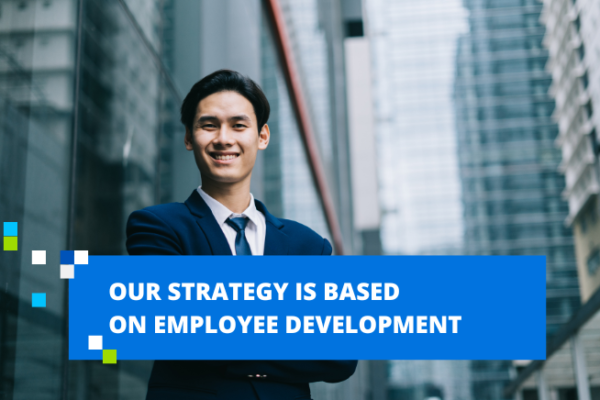No wonder that the demand for competences of the future is constant in our company. In the newly announced strategy of Grow, we committed ourselves to specific investments in the development of our employees, i.e. reskilling and upskilling. We expect that by 2025, 50% of professions in our company will change significantly, and 100% of employees will require at least basic digital competences, including data analysis and cyber security. Together with the management board, we identified areas in which we will particularly need new competencies, i.e.
- innovations and technologies (big data, automation, virtualization, cloud, database support, programming, testing, new technologies);
- customer service (we strive for 70% of customer service to take place via digital channels, which is why we educate in the field of digital sales forms, and create a new approach to customer experience design)
- agile management (change management, adaptation to changes, adaptability)
- competences for all (data, digital competences, cybersecurity, corporate social responsibility).
We operate in a very competitive market. We used to compete for employees with companies in the industry, today we compete with everyone. When we consider technology and IT, almost all sectors expect the same candidate profile. According to portals such as Pracuj.pl or No Fluff Jobs, there are 50,000 jobs waiting on the market. vacancies. Acquiring candidates is very difficult, which is why it is necessary to look for new ways to provide the company with access to specialists with appropriate qualifications. The recruitment period for IT positions in 2021 was 13 days in Orange, and in 2022 it was extended to 52 days. Costs have also increased significantly. During the middle of the year, we used the assumed budget for the whole year. This shows how time-consuming and labor-intensive it is to find the right candidate, who then needs time to implement and get to know the company.
Reskilling gives us completely different possibilities, because it makes us gain a committed employee without risk, one who knows the company, people and processes. Properly prepared, he tries to take over new tasks. While reskilling is changing the role previously performed by an employee to another, upskilling is training the employee and improving qualifications on the position held. Both approaches are important for maintaining the competitiveness of an organization. Our experience shows that the implementation of reskilling and upskilling strategies is worth tidying up.
- First, it is necessary to verify what competencies already exist in the company, what is their current level, and what should be. In Orange, we launched the Skills Up project for this purpose, under which we mapped skills.
- In cooperation with managers, a list of required competencies in individual areas needs to be created, which then, in comparison with the map of competencies, allows you to diagnose gaps that are worth working on.
- Development activities should be planned in such a way as to fill the gap by allocating adequate budgets and prioritizing them.
For example, at Orange we are currently focusing on, among others, on developing analytical skills. We want to retrain up to 300 employees and give them the opportunity to work with advanced data analytics. We know our needs, thanks to which we can offer employees specific actions and development directions. One of them is to double the presence of women in technological professions.
At the moment there are 12% of them, and ultimately it is to be 25%. As such, we actively encourage women to move from non-tech jobs to STEM jobs.
For our own needs, we create predictive models regarding the key needs of employees and factors inducing them to change employers. We know from them that over the course of two years, the perspective of employees has changed a lot, and the most important factor influencing their loyalty to the company is not the salary, but the possibility of development. A conscious employer, if he wants to keep talents, must invest in their development. The more and more often a person trains in the company, the less temptation he has to leave the organization.
It is human nature to want to develop, and we only stimulate it by creating an environment conducive to lifelong learning. We offer e.g. an internal mobility program for Orange JUMP employees, which enables willing people to experience working in a different position (from a week to 3 months). Every fifth manager in Orange decided to change roles in this way, and even management board members took part in the project. Communicating this on the forum motivates other employees to try their hand at a completely new role, which not only satisfies their curiosity, but also often inspires them to reskill. In addition, our employees have an hour each Friday for development. We shape the habit of learning among teams, we encourage managers to regularly talk about development with employees. Because in addition to strategy at the company level, actions at the individual level are also important.

Ewa Krupa, Culture & Development Director, Orange
***
The article is part of a report on employee reskilling titled "The Great Skills Reset," authored by Future Collars and ICAN Institute.
The publication provides a comprehensive overview of issues related to filling the competency gap within companies, as well as a summary of discussions surrounding key challenges in Poland regarding the lack of IT specialists in the Polish job market.
The report is aimed not only at management and HR departments but also at anyone interested in professional and personal development, as well as ensuring a stable position in the future job market.
You can download the full report in both Polish and English versions here:
https://reskilling.pl/raporty/
***
FUTURE COLLARS is a programming and digital competence school. The innovative teaching method of Future Collars is directed towards both individuals who want to change their career path and enter the world of IT, as well as companies seeking effective and efficient development programs for reskilling and upskilling their employees.
The Future Collars offering is continually expanded and adjusted to meet the current needs of the job market and the IT industry. Currently, it consists of 14 COURSES covering various programming languages, UX design, project management, and Business Intelligence.









